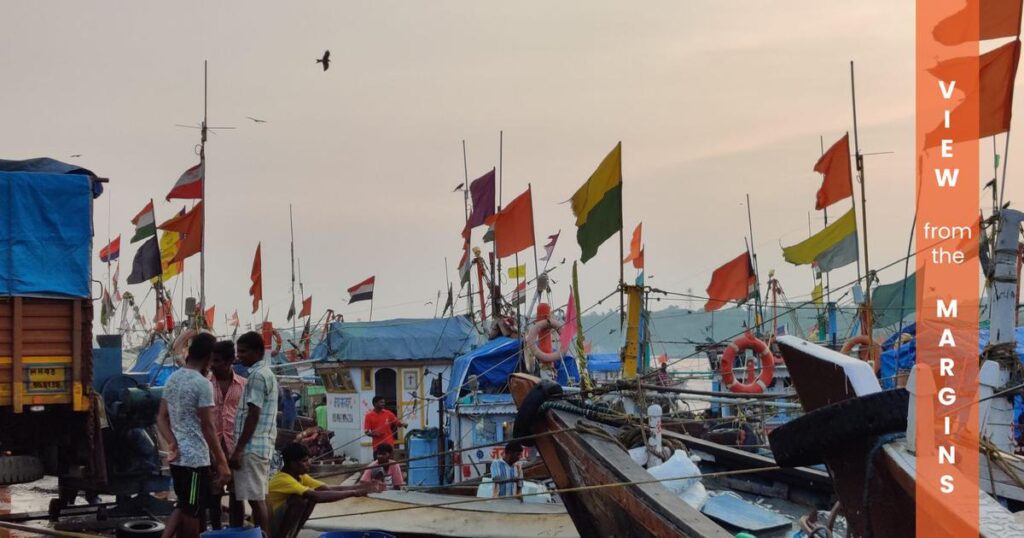A sea breeze carrying with it the faint smell of fish wafts through the hutments in Cuffe Parade’s fishing colony, also known as Machhimar Nagar. For generations, most families here are engaged in the profession the colony is named after. With boats docked at one end, the slum stands in sharp contrast to the towering buildings around it.
From the rocky shoreline, Mumbai’s majestic Marine Drive is visible. The promenade, however, is partially hidden behind giant cranes, machinery and barricades. A newly-constructed coastal road, built on a reclaimed piece of land, now juts out into the sea. Further west, into the Arabian Sea, will be constructed a giant statue of mediaeval Maratha king, Shivaji.
Fish in the sea
These two projects, says Devendra Damodar Tandel, a resident of Machhimar colony, have sealed the fate of fisherfolk in this koliwada, as Koli settlements are known in Mumbai. Fisherfolk by caste, Kolis are the indigenous people of Mumbai, settled before the islands were fashioned into a metropolis by the Raj.
Unchecked development, however, Kolis fear is driving their catch further away from the coast. Construction has polluted waters and destroyed the natural homes that fishes nested in. “Traditional fishing is getting more and more challenging,” Tandel, a Koli himself, said.
The changes are unsettling Koli lives, forcing them out of their traditional profession. Many children of fisherfolk are not actively pursuing fishing. Instead they are looking for jobs in other sectors. Forty three-year-old Tandel is an example: the lean man joined the banking sector to secure a steady income. He says infrastructure projects and their marine impact is the reason why fishing is dwindling as a profession in Mumbai.
A sea state
The Kolis of Mumbai are the most prominent example of just how important the sea and consequently fish are to the state of Maharashtra. Maharashtra’s coastline runs for 720 kilometres, making it the state with the fourth longest coastline, with 526 fishing villages and 3.64 lakh fisherfolk.
In 2021-’22, government data showed 4.32 lakh metric tonne of fish was caught in Maharashtra, down from 4.63 metric tonne in 2014-’15. Tandel worries that excessive use of technology coupled with infrastructure projects along the coast will eventually lead to even less fish being caught. By technology, he means new equipment which leads to overfishing. “We are shortening the marine replenishing cycle,” he said.
The political fallout of this is anger in the Koli community against the ruling Bharatiya Janata Party, who they blame for not doing enough for fisherfolk.
“When Congress was in power at the centre, they neither promoted us nor destroyed our profession,” Tandel said. “But when BJP came, they introduced all these policies and pumped in funding to make it look like they were supporting us. It was just window dressing. BJP is actually supporting corporate interests and doing away with traditional fishing.”
Upholding a legacy
His father Damodar Tandel was well known across Mumbai’s fishing villages as a crusader of the community’s rights. As a child Tandel, the eldest, would tag along, learning the ropes of the fishing trade as well as attending union meetings with his father.
But early on, he knew fishing held little future. So, 16 years ago, the commerce graduate joined the banking sector.
It was only in late 2020, with Damodar’s sudden death due to Covid-19, that Tandel realised he had to take up his father’s unfinished battles. This included legal fights against government projects that affected the coast.
Along the Maharashtra coastline, fishing communities are protesting against such projects. In Palghar district, just north of Mumbai city, which has 98 fishing villages, a proposed port in the ecologically sensitive region threatens the livelihood of 16 villages and more than twenty thousand fisherfolk, who will not be able to fish once the port becomes operational, shows data from the Akhil Maharashtra Machhimar Kruti Samiti, a pressure group of fisherfolk.
“About 17,000 acre will become a no fishing zone due to the port,” Tandel said. Locals have also questioned the environmental clearances the port received this February that ignores the damage it will cause to coral colonies in the region. In February, fisherfolk staged a road block to oppose the clearances and eventually filed a petition in the Bombay High court.
Crushing the Konkan
A similar politics can be seen in Ratnagiri, on the Konkan coast south of Mumbai, where a proposed oil refinery will pollute the sea and kill marine life, locals say.
“Kolis have inhabited the coastlines long before laws came into place,” Tandel said. “But somehow our wellbeing is not taken into consideration when these projects are proposed.”
It is not just the Koli community that suffers. The fishing industry within Mumbai generates employment for over 20 lakh people, Tandel said. This includes transporters, ice suppliers, those who sell fish in markets, suppliers, daily wagers, middle-men and delivery guys. A dip in business affects all stakeholders.
“In the next 20 years, only the rich will be able to afford fish,” Tandel says.
Praful Bhoir, a fisherman for the past 15 years from Machhimar colony, says there is anger against BJP for turning a deaf ear to their problems. He lists the changes within the Worli Koliwada, following the coastal road project. “Now whenever there is a high tide, water enters homes in Worli settlement,” he said.
There is a saying “Mumbai kauna chi?” – Mumbai belongs to whom?. “Aamchi.” Us. “We [Kolis] are the original inhabitants,” Bhoir said. “But in reality, we are unable to claim our own rights.”
Anger against the incumbent
In 2019, the Lok Sabha seats along the Maharashtra coastline were won by the BJP-Shiv Sena alliance. “This time, we are looking to vote for a non-BJP candidate,” Bhoir said. But there is also confusion over which party to support. Maharashtra has witnessed multiple party splits in the last five years.
In Ratnagiri, fisherman Khalil Vasta details how the government has failed fisherfolk. “In Ratnagiri, the problem of illegal fishing is rampant and neither the state nor the centre has done anything about it,” he said. Boats without a fishing licence use light emitting diodes to attract more catch. This has affected marine biodiversity, Vasta explained. “There is little to no time for them (fishes) to replenish” he said.
“The government or politicians have done nothing to punish the violators,” Vasta said.
A scheme that provided funds for purchasing a boat through National Co-operative Development Corporation also ended a few years back. “We want to vote out BJP for all these reasons,” Vasta added.
Back in Mumbai, Tandel knows it is, however, difficult to unite the entire community. Religious politics is already seeping into the Koli community in Palghar and instances of Muslims Kolis being targeted are often heard, he said. Voting, therefore, will not just be for Koli rights. It will involve several other polarising factors.
“This time, the Maha Vikas Aghadi is assuring us it will support our cause,” Tandel said. “Let us see.”
(Courtesy: Scroll.in.)




